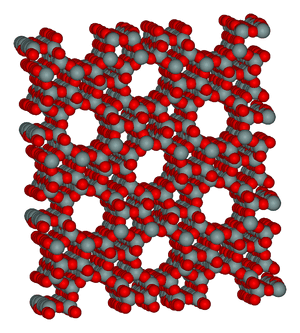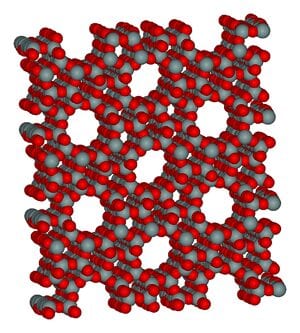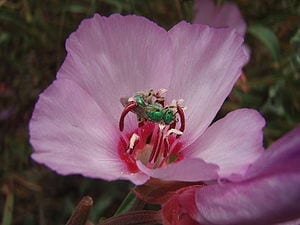
A simple mixture of organic waste, such as chicken manure, and zeolite, a porous volcanic rock, has been developed into a powerful fertiliser which can also reclaim desert or contaminated land.
Food and biofuel crops could be grown and maintained in many places where it wasn’t previously possible, such as deserts, landfills and former mining sites, thanks to an inexpensive, non-chemical soil additive.
The additive, a simple mixture of organic waste, such as chicken manure, and zeolite, a porous volcanic rock, could be used to support agriculture in both the developed and developing world, while avoiding the serious environmental consequences associated with the overuse of chemical fertilisers. The mixture permits a controlled release of nutrients, the regulation of water, and an ideal environment for growing crops.
Researchers from the University of Cambridge have demonstrated that with the addition of the biofertiliser, biofuel crops can be successfully grown and – more importantly, sustained – even on coal waste highly contaminated with metal residues.
Using coal waste from the site of a former colliery in Nottinghamshire as a substrate, the researchers grew rapeseed, flax, sugar beet and maize, with different additives: manure, zeolite, lime, or biofertiliser, as well as coal waste alone and regular garden soil. Plants grown in the coal waste with added biofertiliser achieved nearly twice the weight and yield of those grown in garden soil or in coal waste with added manure, and more than twice the weight and yield of those grown in coal waste with added zeolite. The results are published in the August issue of the International Journal of Environment and Resource.
The coal waste contains chemical elements that can be ionised by the biofertiliser, making nutrients which are essential to growth available for uptake by the plants. As the organic waste in the mixture decomposes, it produces ammonium ions which build up on the surface of the zeolite. When the mixture is added to soil, it boosts the population of micro-organisms responsible for nitrification, which is essential for plant nutrition. The biofertiliser also helps plants develop dense root systems which stabilise the soil against erosion.
In addition to the coal waste, the team is working with marginal soils, such as those in desert climates, which normally require large amounts of water and chemical fertilisers in order for plants to grow. Control experiments have shown that water held in the zeolite increases the moisture content of soil in desert conditions. After initial watering, early-morning dew is held in the pores of the zeolite and released during the hottest part of the day. Plants grown with the biofertiliser achieve greater weight, and in the case of fruits and vegetables, a better taste, than those grown with chemical fertilisers.
BiofertiliserBiofertiliser
The Latest Bing News on:
Biofertiliser
- Biostimulants Market worth $7.6 billion by 2029 - Exclusive Report by MarketsandMarkets™on April 26, 2024 at 2:00 am
The Biostimulants Market is estimated at USD 4.3 billion in 2024 and is projected to reach USD 7.6 billion by 2029, at a CAGR of 12.0% from 2024 to 2029 according to a report published by ...
- Experts discuss soil health, natural farming at Nauni Universityon April 25, 2024 at 2:48 am
Upender Singh provided a practical demonstration on soil sampling methods, while Rajesh Kaushal, Joint Director (Research) and Principal Investigator of the All India Network Project on Soil ...
- Biofertilizer Unit and Food Museum in Eco-tourism inauguratedon April 24, 2024 at 11:43 pm
College of Food Technology at the Central Agricultural University (CAU) in Imphal, Manipur, celebrated the inauguration of its Liquid Bio-fertilizer Production Unit and Food Museum in an Eco-tourism s ...
- Plans for food waste plant recommended for refusalon April 18, 2024 at 10:44 pm
Plans for a new food waste processing plant have been recommended for refusal over environmental fears. The plant would be capable of turning food waste products into biogas for energy, as well as ...
- Plans for food waste plant recommended for refusalon April 18, 2024 at 10:44 pm
The plant would be capable of turning food waste products into biogas for energy, as well as biofertiliser, on a site at Copeland Way, Ellough near Beccles, Suffolk. It could handle 100,000 tonnes ...
- Increasing adoption of biofertilisers in India: problems faced by Indian farmerson April 13, 2024 at 12:33 am
Promoting biofertiliszers in India for sustainable agriculture, addressing environmental issues and enhancing crop productivity effectively.
- Study highlights the potential of cyanobacteria as biofertilizerson March 29, 2024 at 6:49 am
In a new study published in Environments, researchers found they can actually use cyanobacteria as a biofertilizer in iron deficient soils, turning this economic and environmental threat into a ...
- Study highlights the potential of cyanobacteria as biofertilizerson March 28, 2024 at 5:00 pm
"To our knowledge, this is the first study to collect naturally growing cyanobacteria for producing a biofertilizer and demonstrating ecological, environmental, economic and agriculture resilience." ...
- Water pollutant could be soil savioron March 28, 2024 at 9:00 am
It also has a high iron content, unlike local crop soils. In a new study published in Environments, researchers found they can actually use cyanobacteria as a biofertilizer in iron deficient soils, ...
- North Ayrshire plant named as the 100th to join the Biofertiliser Certification Schemeon September 7, 2021 at 12:00 am
The scheme – established back in 2007 and administered by Renewable Energy Assurance Ltd (REAL) – now covers approximately half of the total number of waste-fed AD plants in the UK. The 100 AD plants ...
The Latest Google Headlines on:
Biofertiliser
[google_news title=”” keyword=”Biofertiliser” num_posts=”10″ blurb_length=”0″ show_thumb=”left”]
The Latest Bing News on:
Biofuel crops
- Soaring imports for green diesel disrupt U.S. soy marketon April 27, 2024 at 3:01 am
Companies are closing soybean crushing facilities for longer as used cooking oil and other ingredients are being imported for biofuel production.
- I tried to turn this idle Stardew Valley-like into a nightmarish Palworld-style dystopia, but it fought back by bankrupting meon April 26, 2024 at 7:00 am
With a little bit of Palworld's automation and a lot of Stardew Valley's charm, Rusty's Retirement has literally taken over my computer screen ...
- Could Ohio crops power cruise liners and commercial jets? Ohio Congress members offer bills to make it easieron April 25, 2024 at 12:05 pm
A view of the Ocean Explorer, a Bahamas-flagged Norwegian cruise ship. U.S. Rep. Sherrod Brown, a Cleveland Democrat, introduced legislation that would ensure renewable fuel used by ocean-going ...
- Airlines, farm groups urge crop-based aviation fuel in farm billon April 24, 2024 at 10:39 am
Organizations asked Agriculture Committee leaders in Congress to include incentives for sustainable aviation fuel in the upcoming farm bill.
- noco-noco Collaborates with Binex to Develop Agriculture Based, Soil Sequestered Carbon into Creditson April 24, 2024 at 8:00 am
SINGAPORE and TOKYO, April 24, 2024 (GLOBE NEWSWIRE) -- noco-noco Inc. (NASDAQ: NCNC), (“noco-noco”), signed a Memorandum of Understanding with ...
- Planes pollute the planet, but new technology could clean up the aviation industryon April 23, 2024 at 3:23 pm
A nonstop flight from Los Angeles to New York spews about 1,300 pounds of planet-warming carbon into the air — per passenger.
- Biden Administration invests in clean energy and domestic biofuels for Earth Dayon April 23, 2024 at 9:06 am
Today, in honor of Earth Day 2024, Agriculture Deputy Secretary Xochitl Torres Small announced that the U.S. Department of Agriculture is funding more than 700 clean energy projects to lower energy ...
- Carras Secures ABS' First Biofuel Notation for Aquataurus Bulk Carrieron April 23, 2024 at 1:46 am
Greek shipping company Carras (Hellas) has received the ABS Biofuel-1 notation for its Aquataurus ultramax bulk carrier, the ...
- Biofuels Will Be A Key Part Of The Net-Zero Solutionon April 22, 2024 at 6:00 am
Fuel sourced from living matter could greatly reduce our greenhouse gas emissions. Companies are working on solutions that don't undermine biodiversity in the process.
- How A Former Enron Exec Lured ExxonMobil To Bet $150 Million On A Longshot Biofuelon April 19, 2024 at 3:30 am
Richard Palmer of Global Clean Energy used Exxon money to overhaul an aging California oil refinery in order to process the oil-rich seeds of a plant called camelina. Now Exxon is suing.
The Latest Google Headlines on:
Biofuel crops
[google_news title=”” keyword=”Biofuel crops” num_posts=”10″ blurb_length=”0″ show_thumb=”left”]










